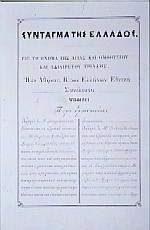Classification and Conservation of Documents

The document collection of the MFA Diplomatic and Historical Archives encompasses the period from the beginning of the Greek national liberation struggle in 1821 to the present. The section of the archives covering the period of the Revolution, which in effect consists of the correspondence of the protagonists in the War of Independence with the philhellene organizations abroad as well as the Greeks of the Ionian Islands, is fairly limited. The official diplomatic correspondence of Greece begins with the Independence of Greece, principally on interstate level. However, the volume of the Greek diplomatic archives began to increase significantly during 1910 to 1920, as Greece participated in international organizations on an equal footing with other member-states. From the post-war period to the present, the production of diplomatic documents has been increasing annually at an impressive rate.
The enormous volume of diplomatic documents assembled in secure facilities in the MFA is organized chronologically - by year - and by provenance. These are the following categories: 1. Archives of the Central Service of the Foreign Ministry, 2. Archives of the Permanent Delegations, Embassies, Consulates and Liaison Offices, and 3. Special Record Groups. The last category relates to specific issues, events or landmarks in Greek foreign policy, examples being the groups of archives relating to the reparations after the Second World War, the Marshall Plan, documents relating to the History of the Greek Jews, and so on. It is worth noting that the original texts of international treaties, conventions and agreements, as well as the documents ratifying them, are preserved separately in the Special Legal Service of the Ministry.
The archival collections of YDIA are kept in various storage facilities, in buildings in the center of the capital that also house the directorates of the MFA, as well as in a new building at the KARAISKAKI military camp (Haidari). This building has been suitably constructed and has been receiving repatriated archives of Greek authorities abroad. A special reading-room inside the building is due to start operating soon. YDIA strives to create the most suitable environment for the storing and preservation of the documents by continually modifying the layout of its storage facilities.
Groups of students from various departments of Greek universities assist in the work of organizing the archival material, as part of voluntary internship programs.
In this context, YDIA has created an excellent and cooperative environment with the humanities departments of Greek educational institutions. This cooperation is mutually beneficial: the Ministry receives significant academic support from young scholars who, under the constant guidance and supervision of the academic staff of YDIA and through their participation in seminars, are allowed to experience the historical era, as it unfolds in the documents they are requested to organize.
An interesting feature of the mutual support in this academic and pedagogical project is that, with the passage of time, a circle of young academics has been created who are not only aware of archival policy issues and the related responsibility, but are also becoming better acquainted with particular foreign policy issues.
The organization of the archival material is carried out on the basis of the provisions of a special Ministerial Decision (AP File 7000/61/ΑΣ 273, Government Gazette Β΄ 2636/18.6.2021) and of the fundamental international regulations relating to archives. At the same time, preservation and archival methods are continually updated while use is made of a special electronic archive and classification system.
In addition to the current routine work of organizing the existing archival material in the Central Service, one of YDIA major concerns is to bring archives of Greek diplomatic and consular authorities abroad back to Greece, as part of a specific repatriation program.


